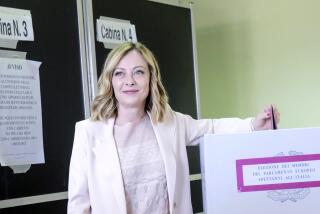Yugoslavs Vote in High-Stakes Test for Peace in Region
- Share via
BELGRADE, Yugoslavia — In a vote overshadowed by charges of foul play and media manipulation by Serbia’s ruling Socialists, millions of people in what remains of Yugoslavia cast ballots Sunday in elections crucial to prospects for peace in the Balkans.
Serbian President Slobodan Milosevic, who is widely seen as the person most responsible for bloodshed in neighboring Bosnia-Herzegovina, was fending off a challenge in his bid for reelection from Yugoslav Prime Minister Milan Panic, who has campaigned on a pledge of peace.
A spokesman for Milosevic’s Serbian Socialist Party said the party’s exit polling showed Milosevic and the party leading in all except two municipalities.
Another exit poll, surveying 1,370 randomly selected voters, showed Milosevic and Panic in a dead heat, each with 47% of the votes.
“The younger voters voted for Panic, and they voted late. There could be some change in favor of Panic,” said Miroljub Sutic, director of Partner Agency, a private polling organization employed by Panic and the opposition Democratic Movement of Serbia.
At stake in the elections, besides the presidency of Serbia, are the legislative bodies of both the shrunken Yugoslav federation, now made up only of Serbia and Montenegro, and the republic of Serbia.
Western diplomats and many Yugoslav observers believe that the outcome of the presidential election could have a pivotal impact on the fighting in Bosnia as well as the prospect for stability in the Balkans beyond the borders of the rump Yugoslav federation, which is not recognized internationally.
Besides Panic and Milosevic, five minor party candidates were in the race for the Serbian presidency, raising the possibility of a runoff, which is required if no candidate receives at least 50% of the vote.
Despite a smear campaign run by state television against Panic, the Belgrade-born naturalized American who heads a Southern California-based pharmaceuticals company, had led in pre-election public opinion polls here in Belgrade, which is the Serbian as well as the federal capital.
Milosevic’s campaign of xenophobia and defiance of the outside world found high favor in working-class urban districts and rural areas of Serbia.
In Belgrade’s industrial suburb of Kaludjerica, Dragan Misovic, a student who voted for the opposition, said: “The workers will vote for Milosevic because they get paid for doing nothing. The factories are all closed, but they draw salaries.”
Many voters in Kaludjerica were hostile toward visiting Western reporters on election day.
“The West should not give us orders. Mind your own business,” said an unshaven man who said he had voted Milosevic. “Tell Eagleburger he can’t run this country,” he shouted in a reference to U.S. Secretary of State Lawrence S. Eagleburger, who last week said that Milosevic should be placed on a list of people for investigation by an international war crimes tribunal.
After Panic, 63, voted in the exclusive suburb of Dedinje, he declared, “This is the beginning of democracy in Yugoslavia.”
Complaints of election irregularities flooded hot lines set up by opposition parties in Belgrade just after the polls opened at 7 a.m.
Milosevic, 51, and his Socialists have muted protests from the fractious opposition by dubbing dissent as treason.
While Milosevic has exploited fears of Western military intervention, many voters in Belgrade hoped for his defeat. They expressed their support for Panic and the opposition.
“I will vote for Panic because I want to be part of Europe and the world, not just of Serbia,” said Vuk Marijanovic, a university student.
Unofficial results of the election are expected today.
More to Read
Sign up for Essential California
The most important California stories and recommendations in your inbox every morning.
You may occasionally receive promotional content from the Los Angeles Times.













